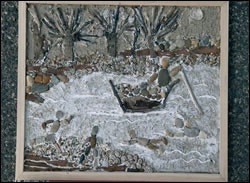 |
One of Danube Day’s most popular eventschallenged schoolchildren
in the Danube Basin to let their ”creativity run wild” and create
sculptures, collages and paintings from materials found by the river. Over
2000, children entered the international competition, and one group travelled
as far as the Danube delta in pursuit of the ‘Danube Art Master’
crown. To bring artists closer to the source, ecological organisation Zhaivoronok
(Skylark), arranged for 12 aspiring artists from Kilya in southern Ukraine,
accompanied by ornithologist Larysa Malukh, local musician Alla Vdovina
and professional artist Viacheslav Malykh, to travel to the Danube Biosphere
Reserve to experience the Danube at its most magnificent.
Towards zero
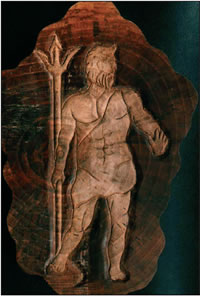 |
The destination for the group was ‘Zero Kilometre’, where the river,
which cuts such a strong path through Europe, becomes lost in the huge waters of the Black Sea. Unlike most rivers, the length of the Danube is counted not from the head, but from the mouth of the river.
Started by the ancient Greeks, who discovered the Danube from their travels
in the Black Sea, this strange tradition is said to bring a majestic power.
Any who pass the ‘Zero Kilometre’ point will have a wish fulfilled.
Travelling first by river ship, and then by local ‘moguna’ as
the river began to divide and sub-divide into hundreds of branches, Malukh
pointed out the stunning wildlife and landscape on the way. Stopping off
on one of the islands, the group climbed a tower and were inspired by the
vista of willows and reeds beneath them. "We saw pink pelicans that
hovered about our boat… cormorants followed us with their eyes...
We made acquaintance with a beauty: a marsh tortoise,” Malukh said.
Inspiration from the waters
At the ‘Zero Kilometre’ point, the group began their work. Kostia,
Oleh, Vova and Vania gathered driftwood to make a piece entitled, ‘The
Danube Abstract Art’, illustrating the power of river debris in the
formation of new islands. Katia created ‘Heart of the Delta’,
a heart-shaped island dissected by a river branch in the form of an arrow.
Masha, Orsana and Vita’s work had a critical environmental message:
”Tourists, you have forgotten your garbage.” At the end of the
trip, the young artists made their wish: "Let our Danube be beautiful
and healthy.” Throughout the river basin, communities share the hope
that the magical powers of ‘Zero Kilometre’ do exist. Zhaivoronok
would like to express their gratitude to the Mayors of Vylkovo and Kilya,
the Director of the Danube Delta Biosphere Reserve, ‘Danube Dawn’
newspaper, NFP (Danube Environmental Forum of Ukraine) and the ICPDR. Thanks
also to Petro Hrytsyshyn for the report on the activities of NFP Ukraine.
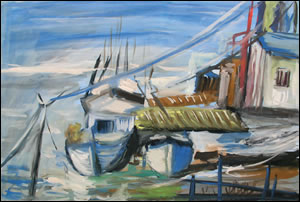 |
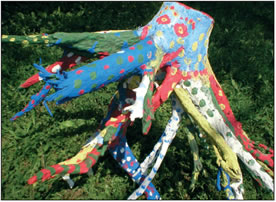 |
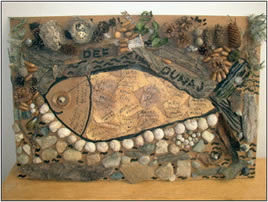 |
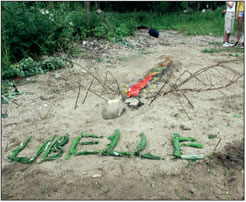 |
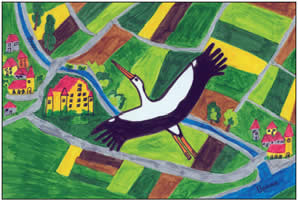 |